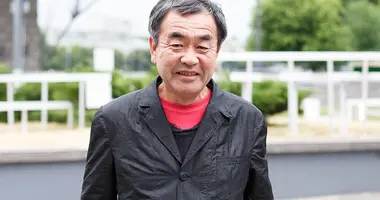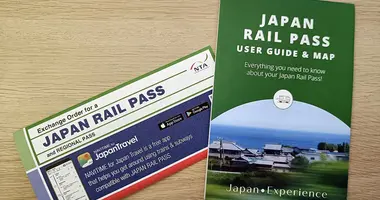Tattoos & Hot Spring Bathing
Tattoos & Hot Spring Bathing: Japan has something of a taboo about tattoos but there are many places where you can soak with inked sink throughout the country.
Tattoos & Hot Spring Bathing
Soaking Your Tattoos in Japan
Greg Goodmacher
 Enjoying an onsen experience in Yunohira Onsen, Niigata, Japan
Enjoying an onsen experience in Yunohira Onsen, Niigata, Japan
Despite the old-fashioned widespread negative attitude toward tattoos in Japan, inked travelers can find soothing Japanese hot springs for soaking.
Your choices, compared to those without body decorations, are limited; however, there are still hundreds of places to dip your decorated skin. And the number is growing. Globalization and the growing inbound tourism industry are leading to more acceptance of tattoos. The hints below will make your journey more pleasant.
 Private Bath with Accommodation at Warakuen Onsen, Ureshino, Kyushu
Private Bath with Accommodation at Warakuen Onsen, Ureshino, Kyushu
Covering Your Tattoos
Covering small tattoos with gauze or Band-Aids is often enough to get you inside bathing facilities with signs asking you to do so. "I do have a small tattoo on my shoulder, but it's small enough that I just always cover it with a large Band-Aid when I go to a hot spring or pool," says one foreign resident of Japan. Bringing spares is a good idea since they might fall off.
In Tokyo, Spadium Japon, a large, modern hot spring facility with numerous types of baths, sells seals for covering tattoos. However, the size is just ten centimeters by fourteen centimeters. People with larger tattoos are not allowed entrance.
 Tattooed Bather in Japan
Tattooed Bather in Japan
Private Baths for Rent
For privacy and complete relaxation, consider renting a hot spring facility for your private use. Many Japanese ryokans, hotels, and onsens have private bathing areas in addition to public ones. But the existence of private baths is often not advertised in English. The following words and phrases are important ones to learn.
Kazokuburo means "family bath." Kashikiriburu translates as "rental bath." The fundamental meaning is the same. It is a private bathing area. Rental times and prices vary. The shortest I have ever come across was thirty minutes at a very popular ryokan. Usually, the period is one hour. The most expensive that I have ever come across was 10,000 yen for a premium bath at an exclusive hotel. The average rates are 1,500 to 2,000 yen per hour.
 Private Rental Bath with View, Oginoyu, Sado Island
Private Rental Bath with View, Oginoyu, Sado Island
Hotels with Private Rooms
Many expensive ryokans and hotels in Japan offer private baths in the rooms. Since it is your room, no one will care how you decorate your body. Many accommodations have a few bedrooms with private baths. Check the hotel's tattoo policy before using the communal baths. Some premium hotels only offer rooms with baths.
Wild Onsen
The natural, "hidden" hot springs on mountain tops, riversides, or on beaches are places without restrictive rules. In remote areas of Japan, one can find natural springs that do not have any buildings around them. A long hike and a long drive are necessary to reach many of these. Several guidebooks include directions to these. When you drop into an information center during a trip to Japan, be sure to ask the staff if there are any hidden or wild springs nearby.
Tattoo-Friendly Locations
Certain cities or villages within Japan accept inked visitors more than other areas do. Beppu, Oita, for example, is known for a high percentage of hot spring facilities that are open to individuals with tattoos.
Upon arriving in Beppu, buy a copy of Be Beppu, a guidebook written in English, Chinese, Japanese, and Korean, to learn which hot springs allow tattooed bathers.
I highly recommend Hyotan Onsen, for its wide variety of baths, and, Beppu Beach Sand Bath, where bathers submerge themselves in hot, steamy sand, with just the head exposed to air.
Acceptance in Kinosaki Onsen
One of the most accepting onsen towns in Japan could be Kinosaki Onsen. Their official website states: Kinosaki Onsen, however, is an onsen town that you can enter without worrying about your tattoos. All seven of the town's public hot springs can be entered with tattoos of any shape or size! Come as you are to Kinosaki Onsen to forget about all of your worries and relax in the soothing bath waters." This town is about two and a half hours from Kyoto.
Hakone
If you are going to Hakone, you might want to visit Hakone Onsen Sanso Nakamura. A worker at this hotel told the writer of this article that they accept people with any variety of body decoration.
Narita and Your Last Bath in Japan
Your last bath in Japan could be Yamatonoyu, which is an elegantly designed day-use hot spring spa for adults (young children are not allowed) that is near Narita Airport. Many people stay their last night in Tokyo in the city of Narita. Yamatonoyu is located just outside of town, but you can get there by a combination of train and walking or by taxi.
The Yamatonoyu website asserts their viewpoint on body decoration: "As there are people wearing tattoos who contribute positively for the betterment of society, so there are people without tattoos who do the exact opposite. At Yamato no Yu, we do not judge guests by how they look or what they choose to wear."
Useful Resources
An excellent resource for finding acceptance at hotels, ryokans, gyms, and hot springs across Japan is Tattoo Friendly Japan. It is in English. A similar list is Tattoo Spot, but this is a Japanese language site. Be careful with the information that you read on the Internet. I have heard stories of people going to hotels that were listed as tattoo-friendly but being turned away because the tattoos were too large or too scary.
This news video by ABC News Australia has an informative discussion of bathing and hot springs in Beppu.
The author of this article blogs about Japanese hot springs at hotspringaddict.blogspot.com
Related
Public Baths in Kyoto: most public bathhouses in Japan's major cities will not be overly concerned about tattoos. Many Japanese yakuza are regular customers, after all.









